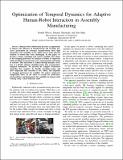Optimization of Temporal Dynamics for Adaptive Human-Robot Interaction in Assembly Manufacturing
Author(s)
Wilcox, Ronald James; Nikolaidis, Stefanos; Shah, Julie A
DownloadRSS_2012_Published_Version.pdf (2.324Mb)
OPEN_ACCESS_POLICY
Open Access Policy
Creative Commons Attribution-Noncommercial-Share Alike
Terms of use
Metadata
Show full item recordAbstract
© 2013 Massachusetts Institute of Technology. Human-robot collaboration presents an opportunity to improve the efficiency of manufacturing and assembly processes, particularly for aerospace manufacturing where tight integration and variability in the build process make physical isolation of robotic-only work challenging. In this paper, we develop a robotic scheduling and control capability that adapts to the changing preferences of a human co-worker or supervisor while providing strong guarantees for synchronization and timing of activities. This innovation is realized through dynamic execution of a flexible optimal scheduling policy that accommodates temporal disturbance. We describe the Adaptive Preferences Algorithm that computes the flexible scheduling policy and show empirically that execution is fast, robust, and adaptable to changing preferences for workflow. We achieve satisfactory computation times, on the order of seconds for moderatelysized problems, and demonstrate the capability for human-robot teaming using a small industrial robot.
Date issued
2012-07Department
Massachusetts Institute of Technology. Department of Aeronautics and Astronautics; Massachusetts Institute of Technology. Department of Mechanical EngineeringJournal
Robotics: Science and Systems VIII
Publisher
Robotics: Science and Systems Foundation
Citation
Wilcox, Ronald, Stefanos Nikolaidis, and Julie Shah. “Optimization of Temporal Dynamics for Adaptive Human-Robot Interaction in Assembly Manufacturing.” Robotics: Science and Systems VIII (July 9, 2012).
Version: Author's final manuscript
ISBN
9780262519687